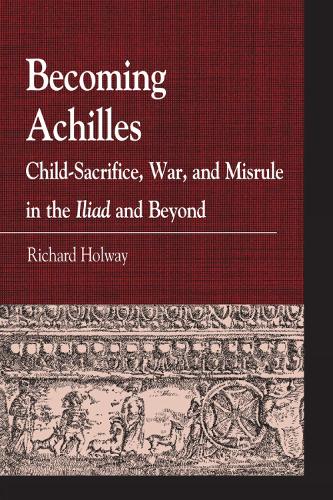
Becoming Achilles: Child-sacrifice, War, and Misrule in the lliad and Beyond
(Paperback)
Publishing Details
Becoming Achilles: Child-sacrifice, War, and Misrule in the lliad and Beyond
By (Author) Richard Kerr Holway
Bloomsbury Publishing PLC
Lexington Books
17th November 2011
United States
Classifications
Tertiary Education
Non Fiction
Literary studies: poetry and poets
883.01
Physical Properties
Paperback
270
Width 154mm, Height 231mm, Spine 19mm
408g
Description
Viewing the Iliad and myth through the lens of modern psychology, in Becoming Achilles: Child-Sacrifice, War, and Misrule in the Iliad and Beyond,Richard Holway shows how the epic underwrites individual and communal catharsis and denial. Sacrificial childrearing generates but also threatens agonistic, glory-seeking ancient Greek cultures. Not only aggression but knowledge of sacrificial parenting must be purged.
Just as Zeus contrives to have threats to his regime play out harmlessly (to him) in the mortal realm, so the Iliad dramatizes threats to Archaic and later Greek cultures in the safe arena of poetic performance. The epic represents in displaced form destructive mother-son and father-daughter liaisons and resulting strife within and between generations.
Holway calls into question the Iliads (and many scholars) presentation of Achilles as a hero who speaks truth to power, learns through suffering, and exemplifies kingly virtues that Agamemnon lacks. So too the Iliads cathartic process, whether conceived as purging innate aggression or arriving at moral clarity. Instead, Holway argues, Achilles (and Socrates) try to prove they are not what at bottom they experience themselves to beneedy, defenseless children, who fear to acknowledge, much less speak out against, parents' use of them to meet parents' needs.
What emerges from Holways analysis is not only a new reading of the Iliad, from its first word to its last, but a revised account of the family dynamics underlying ancient Greek cultures.
Reviews
Holway's evaluation of the Iliad in light of attachment theory and Freudian interpretations of family dynamics represents a valuable contribution to a series of interdisciplinary Greek studies edited by Gregory Nagy. Holway (Univ. of Virginia) posits that Achilles' glory-seeking temperament developed because his mother attempted to use him to retaliate against Zeus for rejecting her, providing illuminating insight into the psychological underpinnings of Greek hero-mythology and Greek culture more broadly. Greek hero literature is literally built on such examples of 'parents sacrificing children's needs to their own.' Dysfunctional families abound in the Homeric tradition, and the deleterious effects on people and institutions match up well with the family psychology literature. Holway pursues these connections to explain heroic violence and glory-seeking (chapter 2), patterns of patriarchy and misogyny (chapters 5 and 6), and even Socrates' actions during and after his trial (epilogue). While the analysis relies heavily on a portion of contemporary psychology to explain much about ancient Greek society, the book is an excellent resource for numerous fields of study. Summing Up: Highly recommended. * Choice Reviews *
There exists a view that in order to be truly great you must sacrifice domestic happiness, perhaps even your life, in pursuit of your goal. In this interesting work by Richard Holway it is argued that the Iliad encourages this unhealthy acceptance of self-destruction as the natural pre-requisite of greatness. Using a psychology-based approach, with particular reference to infant attachment theory, Holway dissects the familial patterns in and around the Iliad to explore why its warriors willingly risk death. * Bryn Mawr Classical Review *
Holway offers a reading of the Iliad focused on destructive and dysfunctional kinship relations, and above all those of father-daughter and mother-son. The anxieties of these relations are, Holway argues, ultimately redirected in a cathartic process through Achilles savage mnis. . . .This is a provocative and interesting book. * The Journal of Hellenic Studies *
Holways book has many strengths. First among these is the novel reading of the Iliad and its background myths motivated by an interest in attachment theory. . . .Becoming Achilles is a worthy addition to the literature on the pedagogical effects of epic or tragedy. . . .Holways book is to be recommended for the way it comes at well-worn material with a fresh perspective. More importantly, the book has much to teach us about the connection between familial and cultural violence, and the interpenetration of the micro and macro forces that shape human communities. * Polis *
By applying the current psychology of attachment theory to the Iliad, this book illuminates Homer and Greek myth. What we see is a culture that depends on and perpetuates child-sacrifice and destructive family dynamics. -- Grace Ledbetter, Swarthmore College
A profound and timeless study of the psychological consequences of being raised in a martial society that values the defense of honorpersonal and collectiveabove all else. -- Randolph Roth, Ohio State University
This book is not only good to think with: it is also good, very good, to talk about. (From the foreword) -- Gregory Nagy, Harvard University
Author Bio
Richard Holway has a PhD in political science from the University of California at Berkeley. The history and social sciences editor at the University of Virginia Press, he teaches in the Department of Politics and the Bachelor of Interdisciplinary Studies Program at the University of Virginia.
